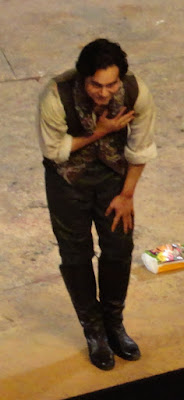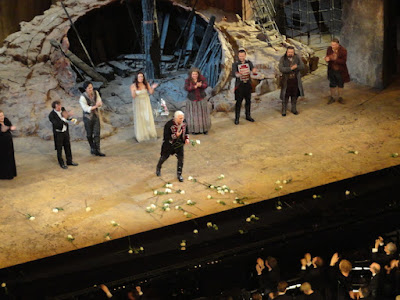(review in English below)
Tive oportunidade
de ver ao vivo a ópera Il Trovatore de G. Verdi na Metropolitan
Opera, a mesma récita que foi transmitida em MetLive na Gulbenkian e que o
camo_opera já comentou aqui.
Na praça em frente
à Metropolitan Opera decorria uma muito pequena manifestação contra os cantores
russos, por apoiarem a guerra na Ucrânia.
A reposição da
encenação de David McVicar, é sempre
agradável de ver porque tira o melhor partido do palco rotativo e dá um dinamismo
particular a esta ópera sempre difícil de encenar.
Foi um excelente
espectáculo, sob a direcção eficaz de Marco
Armiliato. Orquestra e coro ao mais alto nível e os solistas foram
fantásticos.
A Anna Netrebko já tem o estatuto de estrela que é aplaudida logo que entra em palco, mesmo antes de começar a cantar. Mais uma vez deslumbrou, aqui no papel de Leonora. Teve uma interpretação em crescendo, começando algo contida, mas revelando todo o esplendor da sua voz na difícil aria D’amor sull’ali rosee, onde foi insuperável. Continua a ser um privilégio ouvir a Netrebko que nunca grita e é detentora de uma voz lindíssima, potente, penetrante e afinada.
A Azucena do mezzo “da casa” Dolora Zajick é um papel que a artista canta com segurança e potência há várias décadas, mantendo uma qualidade aceitável.
Nos papéis secundários estiveram Stefan Kocan como Ferrando (excelente), Maria Zifchak como Ines e Raúl Melo como Ruiz.
Mas foi o baritono Dmitri Hvorostovsky (Conde di Luna) que
foi o foco de todas as atenções nesta tarde. É um cantor carismático, detentor
de uma bela voz e forte presença em palco. Cantou muito bem, com lirismo e
dramatismo adequados à personagem, mas não foi isso que condicionou o que
aconteceu.
Em Junho, Hvorostovsky anunciou que cancelaria toda a temporada de verão por lhe ter sido diagnosticado um tumor cerebral. Está em pleno tratamento, em Londres, mas interrompeu-o para vir à Metropolitan opera cantar as primeiras 3 das 10 récitas em que a sua presença estava prevista.
Em Junho, Hvorostovsky anunciou que cancelaria toda a temporada de verão por lhe ter sido diagnosticado um tumor cerebral. Está em pleno tratamento, em Londres, mas interrompeu-o para vir à Metropolitan opera cantar as primeiras 3 das 10 récitas em que a sua presença estava prevista.
Logo que apareceu em
palco, foi alvo de uma grande ovação. (Quando ia começar a cantar, tocou
demoradamente um telemóvel!!). Foi sempre muito aplaudido durante o espectáculo
mas seria no final que as demonstrações de afecto principais apareceriam.
Terminada a ópera, foi longamente aplaudido de pé quando apareceu pela primeira
vez nos agradecimentos.
Para além das flores do público,
quando o maestro já estava no palco, empurrou-o para a frente para uma segunda ovação e foi então brindado com uma chuva de rosas brancas atiradas pelos membros da orquestra.
Para além das flores do público,
quando o maestro já estava no palco, empurrou-o para a frente para uma segunda ovação e foi então brindado com uma chuva de rosas brancas atiradas pelos membros da orquestra.
Atitudes bonitas, do cantor, dos músicos e do público. E não sei se haveria melhor local para a fazer que Nova Iorque, dada a constante generosidade do público para com os cantores.
Uma tarde para recordar.
*****
Il Trovatore - Met Opera, New York, October 2015
I had the
opportunity to see live the opera Il Trovatore by G. Verdi at the Metropolitan
Opera, the same performance that was broadcast on MetLive at the Gulbenkian
Foundation and that camo_opera already commented here.
In the
square in front of the Metropolitan Opera stemmed a very small demonstration
against Russian singers, for supporting the war in Ukraine.
David
McVicar staging is always nice to see because it takes full advantage of the
rotating stage and gives a particular dynamism to this opera always difficult
to stage.
It was an
excellent performance, under the efficient direction of Marco Armiliato. Orchestra and choir were at the highest level and
the soloists were fantastic.
South
Korean tenor Yonghoon Lee was one of
the good singers of the night. We had a correct approach, scenic and vocal. The
voice has a light, pleasant timbre and it was always well heard, although in
the upper register it lost some quality. The singer is tall and thin, which
helps, but bears no resemblance to a Spanish.
Anna Netrebko already has the star status that is applauded
as soon as she comes on stage, even before starting to sing. Once again she
dazzled here in the role of Leonora. She had a performance in growing quality,
starting contained, but revealing all the splendour of her voice in the
difficult aria D’amor sull’ali rosee, where she was unsurpassed. It remains a privilege to hear Netrebko who
never shouts and holds a beautiful, powerful, penetrant and tuned voice.
"House"
mezzo-soprano Dolora Zajick was Azucena.
This is a role that the artist sings with security and power for decades, and
she maintains a high quality performance.
In
supporting roles were Stefan Kocan
as Ferrando (excellent), Maria Zifchak
as Ines and Raúl Melo as Ruiz.
But it was Russian
baritone Dmitri Hvorostovsky (Count
di Luna) who was the focus of attention this afternoon. He is a charismatic
singer, owner of a beautiful voice and strong stage presence. He sang very
well, with lyricism and drama appropriate to the character. But that was not
what has conditioned what happened.
In June,
Hvorostovsky announced he would cancel the entire summer season by having been diagnosed
with a brain tumor. He is now in full treatment in London, but interrupted it
to come to the Metropolitan Opera to sing the first 3 of the 10 performances in
which he was scheduled.
Once he
appeared on stage, he was presented with a long ovation. (When he would start
singing, a mobile phone was heard from the audience!!). He has always been
applauded during the performance but the main demonstrations of affection would
appear at the end. After the opera, he was received with a long standing
ovation when he appeared for the first time. When the maestro was on stage, he
pushed him forward to a second ovation and he was then the target of a rain of
white roses thrown by the members of the orchestra.
Beautiful
attitudes by the singer, the musicians, and the public. I do not know of a better
place to do it other than New York, given the constant generosity of the
audience towards singers.
An
afternoon to remember.
*****






















Sem comentários:
Enviar um comentário